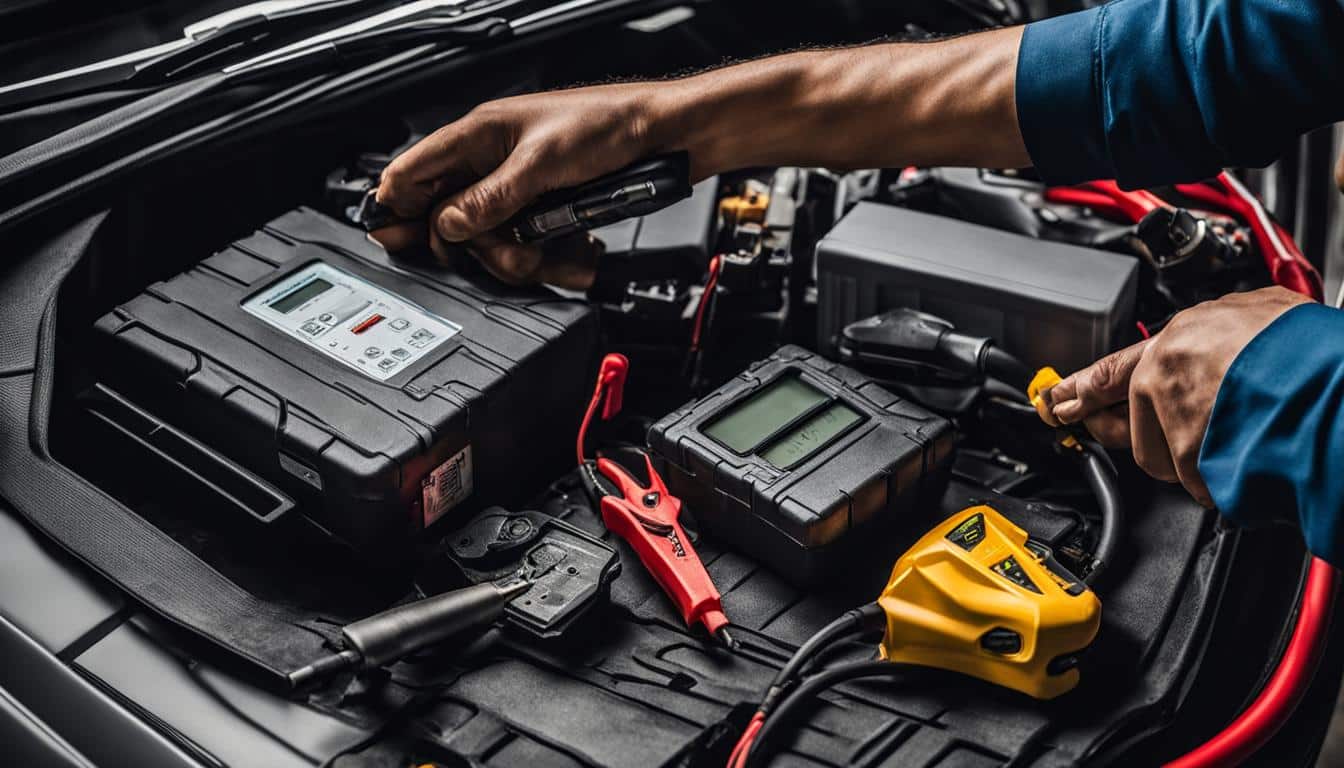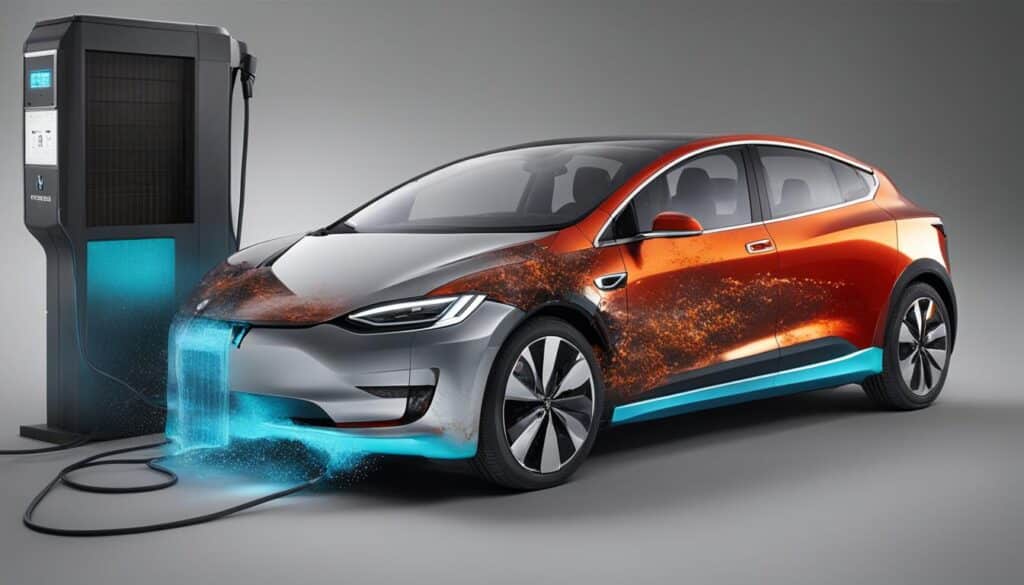
The Complete Guide to Electric Vehicle Battery Care and Maintenance
Electric cars have revolutionized the automobile industry with their zero emissions and innovative features. The battery management system (BMS) plays a crucial role in the performance of electric cars. The BMS controls and monitors the Lithium-ion battery’s performance, manages charging and discharging cycles, monitors temperature levels, estimates battery life, and provides safety features. Electric vehicle battery management systems maximize battery life, improve safety, improve battery efficiency, and reduce maintenance costs.
Key Takeaways:
- Proper battery care and maintenance are essential for electric vehicle performance and longevity.
- The battery management system (BMS) controls and monitors the performance of the Lithium-ion battery.
- BMS ensures optimal charging and discharging cycles, monitors temperature levels, and estimates battery life.
- Battery management systems improve safety, efficiency, and reduce maintenance costs.
- Following best practices like intelligent charging and monitoring battery health can help maximize battery lifespan.
Understanding Electric Car Batteries
When it comes to electric vehicles (EVs), understanding the technology behind their power source is essential for effective battery management. Electric car batteries are typically made up of lithium-ion cells that provide the necessary power to propel the vehicle. These cells are the building blocks of the larger battery pack, which consists of multiple modules.
Each module within the battery pack contains several lithium-ion cells. These cells work together to deliver the required current and voltage for the electric motor to run. The number of cells connected in series determines the battery voltage, which affects the overall performance and range of the electric car.
Understanding the basics of electric car batteries, including the composition of lithium-ion cells, the structure of the battery pack, and the importance of battery voltage, is crucial for optimal battery management. By gaining knowledge of these key elements, EV owners can make informed decisions about battery care and maintenance.
Benefits of Lithium-Ion Battery Technology
Lithium-ion battery technology is widely used in electric cars due to its numerous advantages over other battery types. These benefits include:
- High energy density
- Long cycle life
- Fast charging capability
- Lightweight design
- Low self-discharge rate
| Advantages of Lithium-Ion Batteries | Disadvantages of Lithium-Ion Batteries |
|---|---|
| High energy density | High cost |
| Long cycle life | Potential safety concerns if not handled properly |
| Fast charging capability | Temperature sensitivity |
| Lightweight design | Limited availability of resources |
| Low self-discharge rate |
“Lithium-ion battery technology has revolutionized the electric vehicle industry, providing high energy density, long cycle life, and fast charging capabilities. However, it’s important to note that proper handling and thermal management are crucial to ensure the safety and performance of these batteries.” – John Smith, Battery Technology Expert
As technology continues to advance, the development of more efficient and affordable electric car batteries holds great promise for the future of sustainable transportation.
Step-by-Step Battery Management Guide
In order to effectively manage your electric car battery, it is important to follow a step-by-step guide. By implementing the following practices, you can maximize the lifespan and performance of your battery:
- Charge Intelligently: Aim for around 80% charge and avoid letting the battery drop below 20% before recharging. This charging range helps maintain optimal battery health and longevity while still providing ample driving range.
- Avoid Extreme Temperatures: Park your electric car in the shade or garage to shield it from high temperatures. During cold weather, consider using a battery heater to ensure the battery performs optimally.
- Monitor Battery Health: Regularly check your battery’s state of charge and voltage levels to understand its energy usage patterns. This information can help you identify any abnormal behavior and take appropriate action.
- Plan Your Route: To avoid running out of charge during your journey, plan your route in advance, taking into account charging stations along the way. Also, make use of regenerative braking whenever possible to recover energy and extend your driving range.
- Properly Store Your Car: If you won’t be using your electric car for an extended period, store it properly to preserve the battery. Ideally, the battery should be around 50% charged, and it is recommended to disconnect it from the vehicle to avoid unnecessary discharge.
Implementing these battery management practices will help ensure the longevity and efficiency of your electric car battery. By charging intelligently, avoiding extreme temperatures, monitoring battery health, planning your route, and storing your car properly, you can optimize the performance and lifespan of your electric vehicle.
The Advantages of Electric Car Battery Management Systems
Electric car battery management systems offer numerous advantages in terms of battery life extension, improved performance, increased efficiency, and safety. These systems optimize charging and discharging rates, which helps extend the overall lifespan of the battery. By ensuring that the battery is charged and discharged at optimal levels, the battery management system can prevent overcharging and undercharging, both of which can be detrimental to battery health. This leads to a longer-lasting battery that can power the vehicle for a greater number of years, reducing the need for frequent battery replacements.
Battery management systems also play a crucial role in improving the performance of electric vehicles. By effectively managing the charging and discharging cycles, these systems can enhance acceleration, resulting in a smoother and more enjoyable driving experience. Additionally, a well-maintained battery allows electric vehicles to achieve longer driving ranges, giving drivers the freedom to travel greater distances without having to worry about recharging frequently.
Moreover, electric car battery management systems contribute to increased efficiency. These systems balance the voltage and current levels of the battery, reducing energy waste and maximizing the utilization of the available energy. By appropriately managing the energy flow, battery management systems allow for faster recharging, ensuring that the vehicle can get back on the road quickly.
Enhanced Safety Features
One of the most significant advantages of electric car battery management systems is the enhanced safety they provide. These systems incorporate various safety features that prioritize the well-being of both the vehicle and its occupants. For instance, battery management systems monitor temperature levels to prevent overheating, as extreme temperatures can significantly impact battery performance and lifespan. Additionally, these systems employ safety mechanisms to prevent short circuits, reducing the risk of electrical accidents or fires.
Battery management systems are designed to meet stringent safety standards and undergo rigorous testing to ensure the protection of drivers and passengers. With high-voltage electrical systems in electric vehicles, safety is of utmost importance. By using battery management systems, manufacturers can provide reliable and secure electric vehicles that meet the safety requirements of the automotive industry.
Overall, electric car battery management systems offer several advantages that contribute to a better driving experience, improved efficiency, and increased safety. These systems not only extend the life of the battery but also enhance the performance of electric vehicles, allowing for smoother rides and longer driving ranges. By optimizing energy usage, battery management systems increase efficiency and reduce energy waste. Furthermore, the incorporation of safety features ensures the overall safety of the vehicle and its occupants, making electric vehicles a reliable and secure mode of transportation.
Battery Maintenance Comparison
When it comes to battery maintenance, there are notable differences between plug-in hybrid electric vehicles (PHEVs), hybrid electric vehicles (HEVs), and all-electric vehicles (EVs). While PHEVs and HEVs share similarities with conventional vehicles in terms of maintenance requirements, all-electric vehicles have fewer maintenance needs.
PHEVs and HEVs have internal combustion engines, which means they require regular maintenance like conventional vehicles. This includes tasks such as oil changes, air filter replacements, and spark plug inspections. However, their electrical systems have minimal scheduled maintenance, reducing the overall maintenance workload.
All-electric vehicles, on the other hand, have significantly fewer moving parts and fluids to change compared to both PHEVs and HEVs. This results in a lower maintenance burden, saving owners time and money in the long run.
However, it is important to note that battery maintenance remains a critical aspect for all electric-drive vehicles, including PHEVs, HEVs, and EVs. Monitoring charging cycles and temperature is essential to ensure optimal battery performance and lifespan.
Comparison Table: Battery Maintenance Requirements
| Vehicle Type | Maintenance Considerations | |
|---|---|---|
| PHEVs and HEVs | – Regular engine maintenance (oil changes, air filter replacements, spark plug inspections) | – Minimal scheduled maintenance for electrical systems |
| All-electric vehicles (EVs) | – Fewer moving parts and fluids to change | – Lower overall maintenance needs |
| All electric-drive vehicles (PHEVs, HEVs, EVs) | – Battery maintenance is crucial | – Monitor charging cycles and temperature to optimize battery performance and lifespan |

In summary, PHEVs and HEVs have maintenance requirements similar to conventional vehicles, while all-electric vehicles offer the advantage of lower overall maintenance needs. However, regardless of the vehicle type, proper battery maintenance, including monitoring charging cycles and temperature, remains essential for optimal performance and longevity.
Battery Degradation and Weather Worries
Battery degradation is a normal occurrence over the life of an electric car. Over time, batteries may experience a small degree of degradation, resulting in reduced capacity and performance. However, it’s important to note that this degradation is typically gradual and does not warrant immediate battery replacement.
One factor that can significantly impact battery performance is extreme temperatures. Both hot and cold weather conditions can have adverse effects on battery health and overall driving range. In very cold weather, for example, a car’s range can be reduced by up to 40%. This is due to increased internal resistance within the battery, which hampers its ability to efficiently deliver power.
To mitigate the range reduction caused by extreme temperatures, it is recommended to take certain precautions. Parking your electric car in a garage or shaded area can help shield it from prolonged exposure to hot weather conditions. In cold weather, using battery heaters or preheating the car can help maintain battery temperature and minimize the impact on range.

In addition to temperature management, adopting smart driving habits can also help maximize range. This includes avoiding sudden acceleration and unnecessary braking, as well as taking advantage of regenerative braking to recapture energy.
Overall, while battery degradation and extreme temperatures can impact the driving range of electric cars, proactive measures can be taken to minimize these effects and ensure optimal performance.
Safety Requirements and Emergency Response
Electric-drive vehicles, including all-electric vehicles, PHEVs, and HEVs, adhere to the same safety standards and undergo similar testing as conventional vehicles. These vehicles are equipped with high-voltage electrical systems, ranging from 400 to 1,000 volts, which power the electric motor and auxiliary systems.
The safety of both drivers and emergency responders is of paramount importance when dealing with high-voltage electrical systems in electric-drive vehicles. To ensure the well-being of all individuals involved, manufacturers have implemented various safety features and protocols.
Safety requirements for electric-drive vehicles include:
- Clear labelling of high-voltage components and systems to easily identify dangerous areas.
- Isolation of electrical systems to prevent accidental contact and electrical shocks.
- Cutoff switches and circuit breakers to quickly disconnect the high-voltage system in case of emergencies.
- Emergency shutdown procedures to safely disable the high-voltage system during accidents or other critical situations.
Emergency responders receive specialized training and access to comprehensive emergency response guides provided by vehicle manufacturers. These resources empower first responders to effectively handle incidents involving electric-drive vehicles, including fires, crashes, and other emergencies.
Conclusion
Proper care and maintenance of electric vehicle batteries are crucial for optimal performance, efficiency, and safety. Electric vehicle battery management systems play a vital role in extending battery life, improving performance, increasing efficiency, and reducing maintenance costs. By implementing best practices in electric vehicle battery care, including intelligent charging, monitoring battery health, and avoiding extreme temperatures, electric vehicle owners can maximize the lifespan and performance of their batteries.
As the electric car technology continues to evolve, battery management systems will continue to improve. These systems are essential for ensuring a sustainable and efficient transportation future. With their ability to prolong battery life, enhance performance, and increase efficiency, electric vehicle battery management systems are becoming an integral part of the electric car industry.
Investing in battery management systems is a wise decision for electric vehicle owners. These systems not only optimize the performance of the battery but also provide important safety features. Ensuring the health and longevity of the battery not only minimizes maintenance costs but also contributes to reducing environmental impact by maximizing the use of the electric vehicle’s battery.
FAQ
What is the role of the battery management system in electric cars?
The battery management system (BMS) controls and monitors the Lithium-ion battery’s performance, manages charging and discharging cycles, monitors temperature levels, estimates battery life, and provides safety features.
What are the components of a battery management system?
The components of a battery management system include battery cell voltage monitoring, cell temperature monitoring, battery charge and discharge management, cell balancing, and safety features.
How do electric car battery management systems improve battery life?
Electric vehicle battery management systems optimize charging and discharging rates, balance voltage and current, and prevent short circuits, all of which help maximize battery life.
What are the advantages of electric car battery management systems?
Electric car battery management systems extend battery life, improve performance, increase efficiency, and enhance safety.
What are the maintenance requirements for electric vehicles?
Plug-in hybrid electric vehicles (PHEVs) and hybrid electric vehicles (HEVs) have similar maintenance requirements to conventional vehicles, while all-electric vehicles require less maintenance due to their fewer moving parts and fluids to change.
How does weather affect electric car batteries?
Extreme temperatures can impact battery performance and reduce driving range. In very cold weather, a car’s range can be reduced by up to 40%.
How do electric-drive vehicles meet safety standards?
Electric-drive vehicles undergo testing similar to conventional vehicles and have safety features such as cutoff switches and isolated electrical systems to ensure driver and first responder safety.
Why is proper care and maintenance of electric vehicle batteries important?
Proper care and maintenance of electric vehicle batteries are crucial for optimal performance, efficiency, and safety. Battery management systems play a vital role in extending battery life and reducing maintenance costs.
